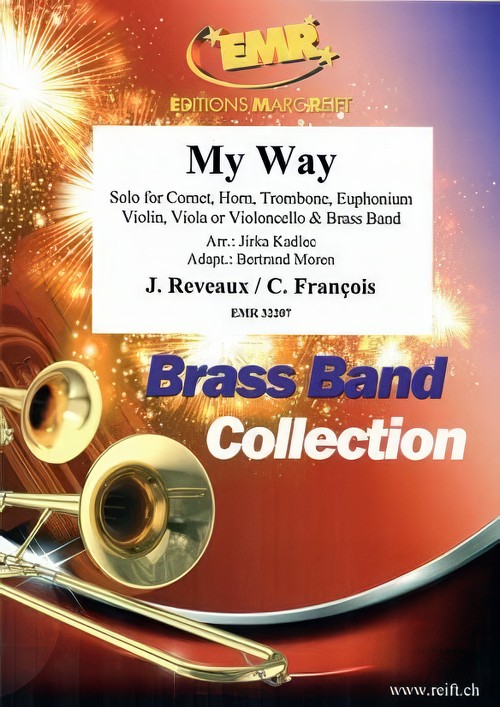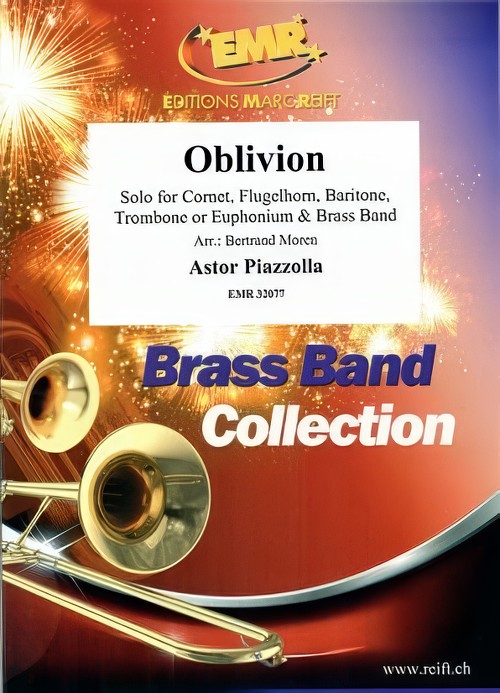Results
-
 £95.00
£95.00My Way (Flexible Solo with Brass Band - Score and Parts) - Francois & Revaux - Kadlec & Moren
Solo for Cornet, Eb Horn, Trombone, Euphonium, Violin, Viola or VioloncelloDuration: 3.45
Estimated dispatch 7-14 working days
-
 £40.00
£40.00NOBODY DOES IT BETTER (Brass Band) - Hamlisch, Marvin - Wormald, Christopher
Featuring trombone, flugel, tenor horn and baritone, this arrangement is faithful to the 1977 hit from the James Bond film?The Spy Who Loved Me, and playable by all grades of band. Grade: 4th section +. Duration: 3:00
Estimated dispatch 7-14 working days
-
 £56.00
£56.00O Mein Papa (Brass Band - Score and Parts) - Burkhard, Paul - Fernie, Alan
Slightly reduced Brass Band instrumentation (no rep cornet, no 2nd horn, no 2nd trombone part)
Estimated dispatch 7-14 working days
-
 £85.00
£85.00Oblivion (Flexible Solo with Brass Band - Score and Parts) - Piazzolla, Astor - Moren, Bertrand
Solo for Cornet, Flugelhorn, Baritone, Trombone or EuphoniumDuration: 4.00
Estimated dispatch 7-14 working days
-
 £59.70
£59.70Opera Pops (Brass Band - Score and Parts) - Woodfield, Ray
Slightly reduced Brass Band instrumentation (no rep cornet, no 2nd horn, no 2nd trombone part)Includes:Brindisi (La Traviata)Carnival of VeniceAnvil Chorus (Il Trovatore)Toreador's Song (Carmen)O Mio Babbino Caro (Gianni Schicchi)Chorus of the Hebrew Slaves (Nabucco)Grand March (Aida)
Estimated dispatch 7-14 working days
-
 £56.00
£56.00Orpheus in the Underworld, Finale from (Brass Band - Score and Parts) - Offenbach, Jacques - Woodfield, Ray
Slightly reduced Brass Band instrumentation (no rep cornet, no 2nd horn, no 2nd trombone part)
Estimated dispatch 7-14 working days
-
 £56.00
£56.00Passacaglia (Brass Band - Score and Parts) - Widorski, Kurt Georg
So gehst Du nun, mein Jesu, hinSlightly reduced Brass Band instrumentation (no rep cornet, no 2nd horn, no 2nd trombone part)
Estimated dispatch 7-14 working days
-
 £52.40
£52.40Peace Perfect Peace (Brass Band - Score and Parts) - Mayhew, Kevin - Mabon, Cameron
Slightly reduced Brass Band instrumentation (no rep cornet, no 2nd horn, no 2nd trombone part)
Estimated dispatch 7-14 working days
-
 £59.70
£59.70Pictures at an Exhibition (Brass Band - Score and Parts) - Mussorgsky, Modest - Hume, Rob J.
Slightly reduced Brass Band instrumentation (no rep cornet, no 2nd horn, no 2nd trombone part)Includes:Promenade and GnomusThe Old Castle (Il Vecchio Castello)Ballet of the Chicks in their ShellsThe Great Gate of Kiev
Estimated dispatch 7-14 working days
-
 £56.00
£56.00Plaisir d'Amour (Cornet Solo with Brass Band - Score and Parts) - Woodfield, Ray
Slightly reduced Brass Band instrumentation (no rep cornet, no 2nd horn, no 2nd trombone part)
Estimated dispatch 7-14 working days
